名词性从句(配套课件)
合集下载
高中英语名词性从句课件(共42张ppt)
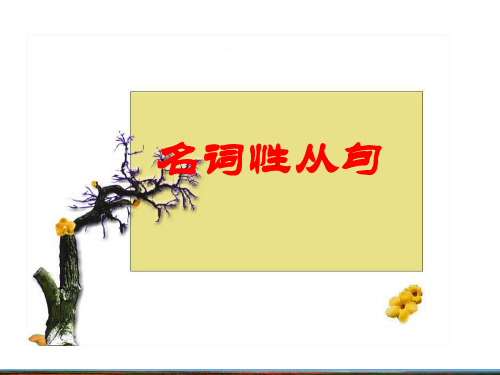
China is no longer _w__h_a_t_ it used to be.
4. A modern city has been set up in ______ was a wasteland ten years ago. (天津) A. what B. which C. that D. where
which
作主/宾/
3. 连接副词: when、 where、why、ho表w
作状语
主语从句一般有三种结构: 1. 主语从句+谓语 That she will win the match is certain. 2.主语从句+形容词(名词词组、过去分词)+that从句
It is important that we teens should learn English. It is a good news that he will attend the meeting on behalf of our school.
1. __T_h_a__t _ he said so made us angry . _W___h_a_t_ he said at the meeting made us angry.
2. A computer can only do___w__h_a_t__ you have
instructed it to do. (全国) 3. 中国不再是过去的样子了。
It looks as if it’s going to rain.
3.the reason why … is that … 和It is because …等结构。
It was because I got up late.
同位语从句在句中作同位语,它一般要放在主 句中某些名词的后面,说明这些名词的含义。可跟 同位语从句的名词主要有: fact, news, promise, reason, idea, hope, word, belief等。 如:
4. A modern city has been set up in ______ was a wasteland ten years ago. (天津) A. what B. which C. that D. where
which
作主/宾/
3. 连接副词: when、 where、why、ho表w
作状语
主语从句一般有三种结构: 1. 主语从句+谓语 That she will win the match is certain. 2.主语从句+形容词(名词词组、过去分词)+that从句
It is important that we teens should learn English. It is a good news that he will attend the meeting on behalf of our school.
1. __T_h_a__t _ he said so made us angry . _W___h_a_t_ he said at the meeting made us angry.
2. A computer can only do___w__h_a_t__ you have
instructed it to do. (全国) 3. 中国不再是过去的样子了。
It looks as if it’s going to rain.
3.the reason why … is that … 和It is because …等结构。
It was because I got up late.
同位语从句在句中作同位语,它一般要放在主 句中某些名词的后面,说明这些名词的含义。可跟 同位语从句的名词主要有: fact, news, promise, reason, idea, hope, word, belief等。 如:
名词性从句讲解课件

的名词或代词后面。
02
名词性从句的引导词
that的用法
引导主语从句、宾语从句、表语 从句和同位语从句。
在从句中不充当任何成分,只起 连接作用。
不可省略的情况:宾语从句中引 导词that不可省略,但当宾语从 句作为介词宾语时,可以省略。
what的用法
引导主语从句、宾语从句、表语从句和同位语从句。
将来时
表示将来会发生或存在的动作或状态。 在名词性从句中使用将来时,通常表 示该动作或状态尚未发生,但说话者 认为它将会发生。例如:“The prediction that the economy will recover next year is optimistic.” (明年经济将会复苏的预测是乐观 的。)
感谢您的观看
THANKS
作用
补充信息,使句子结构完 整,表达更丰富。
分类
01
02
03
04
主语从句
在句子中充当主语的名词性从 句,通常放在句首。
宾语从句
在句子中充当宾语的名词性从 句,通常放在动词或介词后面
。
表语从句
在句子中充当表语的名词性从 句,通常放在系动词后面。
同位语从句
对名词或代词进行补充说明的 名词性从句,通常放在所修饰
04
名词性从句与定语从句的区 别
定义与分类的区别
名词性从句
在句子中起名词作用的句子,用 来担任主语、宾语、表语和同位
语。
定语从句
用来修饰名词或代词的从句,通常 放在被修饰的名词或代词之后。
总结
名词性从句和定语从句都是从句的 一种,但它们在句子中的作用和位 置不同。
引导词的区别
名词性从句的引导词
VS
02
名词性从句的引导词
that的用法
引导主语从句、宾语从句、表语 从句和同位语从句。
在从句中不充当任何成分,只起 连接作用。
不可省略的情况:宾语从句中引 导词that不可省略,但当宾语从 句作为介词宾语时,可以省略。
what的用法
引导主语从句、宾语从句、表语从句和同位语从句。
将来时
表示将来会发生或存在的动作或状态。 在名词性从句中使用将来时,通常表 示该动作或状态尚未发生,但说话者 认为它将会发生。例如:“The prediction that the economy will recover next year is optimistic.” (明年经济将会复苏的预测是乐观 的。)
感谢您的观看
THANKS
作用
补充信息,使句子结构完 整,表达更丰富。
分类
01
02
03
04
主语从句
在句子中充当主语的名词性从 句,通常放在句首。
宾语从句
在句子中充当宾语的名词性从 句,通常放在动词或介词后面
。
表语从句
在句子中充当表语的名词性从 句,通常放在系动词后面。
同位语从句
对名词或代词进行补充说明的 名词性从句,通常放在所修饰
04
名词性从句与定语从句的区 别
定义与分类的区别
名词性从句
在句子中起名词作用的句子,用 来担任主语、宾语、表语和同位
语。
定语从句
用来修饰名词或代词的从句,通常 放在被修饰的名词或代词之后。
总结
名词性从句和定语从句都是从句的 一种,但它们在句子中的作用和位 置不同。
引导词的区别
名词性从句的引导词
VS
必修三《名词性从句》课件(共26张PPT)

7. My suggestion is ______ we should
turn the land into rice fields.
A. what
C. which
B. that
D. where
8. His proposal is that the dam ______
at the foot of the mountain.
{
同位语 I don’t know about the fact that he is a teacher
{
I don’t know about the man, Mr. White.
Fan Bingbing and Lichen are dating.
The big news makes their fans surprised That Fan Bingbing and Lichen are
Practice time
二、名词性从句的写法 名词性从句是学生在写作中喜欢尝试的 复杂句,在写作时可采用“三步法”:
[示例]
第一步:写出两个简单句。
①He said a lot at the meeting.
②His words were very attractive.
第二步:让句①作主语从句,可转换为“他在会上所说的话”,即what he said at the meeting。 第三步:把句①转换的主语从句和句②连在一起。 What he said at the meeting was very attractive.
[即时演练] 把下列每组题中的两个简单句合并为一个含有名词性从句的复合句 1.When did you enter the room? The police wants to know it. ____________________________________________________________________
名词性从句{课件}
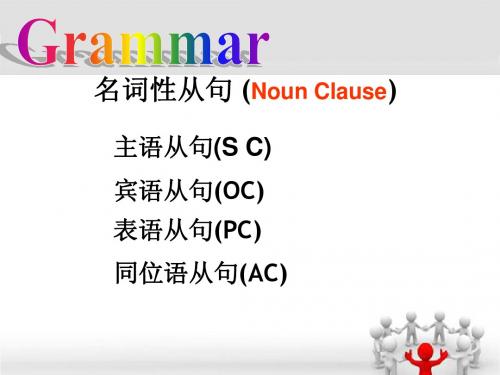
2.You could hardly know ______. A. how can I deal with it ★ how I can deal with it B. C. what can I deal with it D. what I can deal with it
3.He asked____for a violin A. did I pay how much B. I paid how much C. how much did I pay ★ how much I paid D.
kill… for money
I suggest that … should (not)… My suggestion is that … should (not)…
I have the suggestion that … should (not)…
It is suggested that … should (not)…
give off
smoke
What makes animals endangered?
That That the factory pours waste water into rivers makes fish endangered.
pour waste water into rivers
What makes animals endangered?
4.The fact that he told me excited me.
定语从句
时态问题
1. He said that he will go to the station. . would travels 2. Our physics teacher once told us that light __________ ( travel ) faster than sound. went 3. Tom says that Mary ____ (go) abroad last year and has been _________ (be) there for nearly 5 months.
名词性从句讲解(共30张PPT)
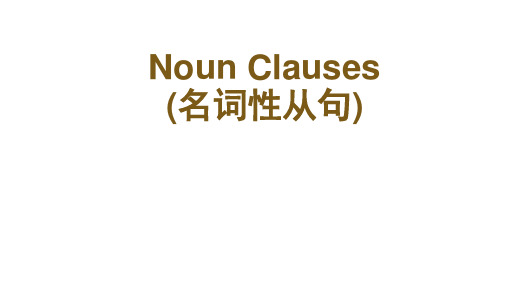
This is his job. This is what he does every day.
I don’t like his job. I don’t like what he does every day.
I don’t know about the man, Mr. White. I don’t know about the fact that he is a teacher.
主语
表语
4. This is what he does every day.
主语
表语
5. I don’t like what he does every day. 动词宾语
主语
宾语
英语句子的种类
简单句 (simple sentence) 并列句 (compound sentence) 复合句 (complex sentence)
❖Lin Tao feels (that) his own team is even better. ❖She says (that) she won’t take part in the sports meeting next Sunday. ❖Jim thought (that) the train was like a big moving party.
引导词
连词 that, whether, if
疑问代词 who, whom, whose, which, what, whoever, whatever等
疑问副词 when, where, why, how等
Object Clause 宾语从句
1. I know him . (简单句)
主语 谓语 宾语
think, find, consider, believe, feel, make
I don’t like his job. I don’t like what he does every day.
I don’t know about the man, Mr. White. I don’t know about the fact that he is a teacher.
主语
表语
4. This is what he does every day.
主语
表语
5. I don’t like what he does every day. 动词宾语
主语
宾语
英语句子的种类
简单句 (simple sentence) 并列句 (compound sentence) 复合句 (complex sentence)
❖Lin Tao feels (that) his own team is even better. ❖She says (that) she won’t take part in the sports meeting next Sunday. ❖Jim thought (that) the train was like a big moving party.
引导词
连词 that, whether, if
疑问代词 who, whom, whose, which, what, whoever, whatever等
疑问副词 when, where, why, how等
Object Clause 宾语从句
1. I know him . (简单句)
主语 谓语 宾语
think, find, consider, believe, feel, make
名词性从句PPT课件

语态:被动语态和主动语态
被动语态
表示动作的接受者是主语,如 "The book was written by him."中的主语从句"The book was written"使用被动语态。
主动语态
表示动作的执行者是主语,如 "He wrote the book."中的主语 从句"He wrote the book"使用 主动语态。
抽象名词翻译
在汉译英时,有时需要将具体 名词抽象化,以使译文更加符
合英语表达习惯。
THANKS FOR WATCHING
感谢您的观看
04 名词性从句的特殊结构
it作形式主语
形式主语用于代替主 语从句,避免句子结 构不平衡。
It is important that we should learn English well.
It is+形容词/名词 +that+主语从句。
强调句型中的名词性从句
01
It
is/was+被强调部分
+that/who+句子其余部分。
表示现在的动作或状态,如"I know who he is."中的宾语 从句"who he is"使用现在时态。
过去时态
表示过去的动作或状态,如"He said that he was a student."中的宾语从句"he was a student"使用过去时态。
将来时态
表示将来的动作或状态,如"I will tell you what will happen."中的宾语从句"what will happen"使用将来时态。
高中英语名词性从句课件(38张ppt)
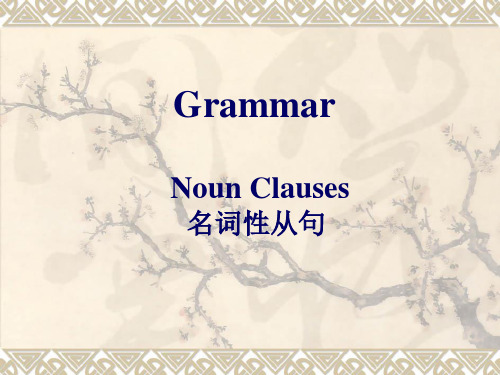
The idea that computers can recognize human voices surprises many people.
(that在从句中不充当任何成份)
The idea (that/which) he gave surprises many people.
(that在从句中作gave 的宾语)
宾语从句须注意
1) 由疑问词引导的从句中, 词序按陈述句 顺序排列。
e.g. I wonder what he is doing. 注意:I wonder what was wrong /the matter
with him. 2)当主句的谓语动词是过去时的时候, 从句的 谓语动词应用相应的过去时。自然规律和客观 真理例外。
4) That在其他名词性从句中均不可省略,只有 在宾语从句中that有时可以省略,但在并列 的宾语从句中第二个that 不可省略。
e.g. He said (that) he would leave and that he would never come back again.
5) 否定的转移 若主句谓语动词为think, consider, suppose, believe, expect, fancy, guess, 等, 其后的宾语 从句若含有否定意义, 一般要把否定词转移到 主句谓语上, 从句谓语用肯定式。 e.g. I /we don’t think this dress fits you Well, does it?
3. 连接代词: what, whatever, who, whoever, whom,whose, which(哪个): 不仅起到连接一个句子的作用,同时也是从句 的一个组成部分;从句不完整,缺成份。
(that在从句中不充当任何成份)
The idea (that/which) he gave surprises many people.
(that在从句中作gave 的宾语)
宾语从句须注意
1) 由疑问词引导的从句中, 词序按陈述句 顺序排列。
e.g. I wonder what he is doing. 注意:I wonder what was wrong /the matter
with him. 2)当主句的谓语动词是过去时的时候, 从句的 谓语动词应用相应的过去时。自然规律和客观 真理例外。
4) That在其他名词性从句中均不可省略,只有 在宾语从句中that有时可以省略,但在并列 的宾语从句中第二个that 不可省略。
e.g. He said (that) he would leave and that he would never come back again.
5) 否定的转移 若主句谓语动词为think, consider, suppose, believe, expect, fancy, guess, 等, 其后的宾语 从句若含有否定意义, 一般要把否定词转移到 主句谓语上, 从句谓语用肯定式。 e.g. I /we don’t think this dress fits you Well, does it?
3. 连接代词: what, whatever, who, whoever, whom,whose, which(哪个): 不仅起到连接一个句子的作用,同时也是从句 的一个组成部分;从句不完整,缺成份。
名词性从句讲解课件

that用作引导词,在名词性从句中不充当任何成 分,只起连接作用。
02 功能
用于引导主语从句、宾语从句、表语从句和同位 语从句。
03 例子
The news that he passed the exam was unexpected.(他通过考试的消息是出人意料 的。)
whether的用法
01
02
03
定义
whether用作引导词,在 名词性从句中充当成分, 表示“是否”。
功能
用于引导主语从句、宾语 从句、表语从句和同位语 从句。
例子
I don't know whether he will come or not. (我不知道他是否会来。)
who/whom/whose的用法
定义
who/whom/whose用作 引导词,在名词性从句中 充当成分,表示“谁”。
as引导的让步状语从句
总结词
表示转折关系
详细描述
as可以引导让步状语从句,表示“尽管、虽然”的意思。这种从句通常出现在主句之前,用于 强调从句中的内容。
than引导的比较状语从句
总结词
表示比较关系
详细描述
than可以引导比较状语从句,表示“比...更...”的意思。这种从句通常出现在主 句之后,用于强调两者之间的差异或优劣。
被动语态
表示主语是动作的接受者。例如:“It was said that the book would be published next year.”
时态与语态的结合使用
现在进行时的被动语态
表示正在被进行的动作或存在的状态。例如: “We are being told that the game is about to start.”
02 功能
用于引导主语从句、宾语从句、表语从句和同位 语从句。
03 例子
The news that he passed the exam was unexpected.(他通过考试的消息是出人意料 的。)
whether的用法
01
02
03
定义
whether用作引导词,在 名词性从句中充当成分, 表示“是否”。
功能
用于引导主语从句、宾语 从句、表语从句和同位语 从句。
例子
I don't know whether he will come or not. (我不知道他是否会来。)
who/whom/whose的用法
定义
who/whom/whose用作 引导词,在名词性从句中 充当成分,表示“谁”。
as引导的让步状语从句
总结词
表示转折关系
详细描述
as可以引导让步状语从句,表示“尽管、虽然”的意思。这种从句通常出现在主句之前,用于 强调从句中的内容。
than引导的比较状语从句
总结词
表示比较关系
详细描述
than可以引导比较状语从句,表示“比...更...”的意思。这种从句通常出现在主 句之后,用于强调两者之间的差异或优劣。
被动语态
表示主语是动作的接受者。例如:“It was said that the book would be published next year.”
时态与语态的结合使用
现在进行时的被动语态
表示正在被进行的动作或存在的状态。例如: “We are being told that the game is about to start.”
名词性从句优秀PPT课件

解析
A选项中“What”引导的是主语 从句,表示“他说的话不是真实 的”。B选项中“Who”引导的 是主语从句,表示“谁将去参加 会议还不知道”。C选项中 “Why”引导的是主语从句,表 示“他为什么离开学校还是一个 谜”。
THANKS
感谢观看
whom的用法
引导定语从句,相当于“whom”
引导名词性从句,相当于“who”
whose的用法
引导定语从句,表示“谁的”
引导名词性从句,表示“谁的”
which的用法
01
引导定语从句,相当于 “which”
02
引导名词性从句,相当于 “which”
03
名词性从句的时态与语序
时态的用法
一般现在时
A选项中“It is strange that…”是一个固定句型, 表示“奇怪的是…”,其中 that引导的从句是主语从句 。B选项中“It is a pity that…”也是一个固定句型 ,表示“遗憾的是…”,其 中that引导的从句是主语从 句。C选项中“where”引 导的是地点状语从句,表示 “在哪里”。
解决方案
在编写或修改名词性从句时,要特别注意主谓一致的问题,确保主语和谓语在 单复数形式上保持一致。
从句中的时态错误
时态不一致
在描述过去、现在或未来的事件时,时态的使用是关键。例 如,“If I was younger, I would do it”中,“was”与 “would do”之间存在时态不一致的错误。
用于表达过去某个时间正 在进行的动作。
时态的用法
过去完成时
用于表达过去的过去,即过去某个时 间之前发生的动作或状态。
过去完成进行时
用于表达过去的过去,即过去某个时 间之前正在进行的动作。
《名词性从句》课件

现在进行时
表示正在进行的动作或存在的状态。例如:They are knowing (that) he is studying.
现在完成时
表示过去的动作对现在的影响或结果。例如:He has known (that) she has left.
语态的用法
主动语态
表示主语执行的动作。例如:We found (that) he was studying.
不管什么样的”。
特点
what引导的名词性从句相当于一 个特殊疑问句。
使用场景
what常用于引导主语从句、宾语从 句和表语从句。
which的用法
定义
which用作连词时,引导名词性 从句,表示选择关系。
特点
which在从句中充当主语、宾语 或定语,表示选择范围。
使用场景
常用于引导宾语从句和定语从句 ,表示选择关系。
特点
具有名词的语法功能,同 时又保留了从句的句法结 构。
类型
主语从句、宾语从句、表 语从句和同位语从句。
名词性从句的种类
主ห้องสมุดไป่ตู้从句
在复合句中充当主语的 从句,通常放在句首。
宾语从句
在复合句中充当宾语的 从句,通常放在动词或
介词后。
表语从句
在复合句中充当表语的 从句,通常放在系动词
后。
同位语从句
在复合句中充当同位语 的从句,通常放在名词 后,对名词进行补充说
名词性从句的引导词
what、which、who/whom、whose等。
定语从句的引导词
that、which、who/whom、whose等。
从句在句子中的位置
名词性从句
可以位于句首、句中或句尾。
表示正在进行的动作或存在的状态。例如:They are knowing (that) he is studying.
现在完成时
表示过去的动作对现在的影响或结果。例如:He has known (that) she has left.
语态的用法
主动语态
表示主语执行的动作。例如:We found (that) he was studying.
不管什么样的”。
特点
what引导的名词性从句相当于一 个特殊疑问句。
使用场景
what常用于引导主语从句、宾语从 句和表语从句。
which的用法
定义
which用作连词时,引导名词性 从句,表示选择关系。
特点
which在从句中充当主语、宾语 或定语,表示选择范围。
使用场景
常用于引导宾语从句和定语从句 ,表示选择关系。
特点
具有名词的语法功能,同 时又保留了从句的句法结 构。
类型
主语从句、宾语从句、表 语从句和同位语从句。
名词性从句的种类
主ห้องสมุดไป่ตู้从句
在复合句中充当主语的 从句,通常放在句首。
宾语从句
在复合句中充当宾语的 从句,通常放在动词或
介词后。
表语从句
在复合句中充当表语的 从句,通常放在系动词
后。
同位语从句
在复合句中充当同位语 的从句,通常放在名词 后,对名词进行补充说
名词性从句的引导词
what、which、who/whom、whose等。
定语从句的引导词
that、which、who/whom、whose等。
从句在句子中的位置
名词性从句
可以位于句首、句中或句尾。
名词性从句讲解最全版ppt教学课件
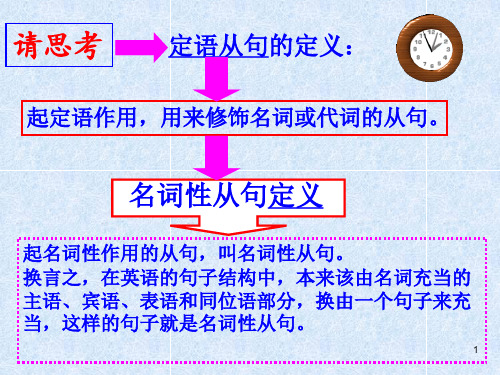
practical .
(宾语从句)
16
为深入学习习近平新时代中国特色社 会主义 思想和 党的十 九大精 神,贯彻 全国教 育大会 精神,充 分发挥 中小学 图书室 育人功 能
名词性从句引导词的用法(3):
连接代词
“whoever”-- “-----的任何人”、作主语、 “whomever”-- “-----的任何人”、作宾语、 “whatever”-- “----的任何东西”、作主表宾语、 “whichever”--- “无论哪个或哪些---”、作定语、
4、Could you tell me the question whether English is
useful for us now(. 同位语从句)
7
为深入学习习近平新时代中国特色社 会主义 思想和 党的十 九大精 神,贯彻 全国教 育大会 精神,充 分发挥 中小学 图书室 育人功 能
If与whether的区别:
17
为深入学习习近平新时代中国特色社 会主义 思想和 党的十 九大精 神,贯彻 全国教 育大会 精神,充 分发挥 中小学 图书室 育人功 能
“whoever”-- “---的任何人”、作主语、起连接作用
1、Whoever could solve the problem will be
rewarded .
(主语从句)
2、What he wants to ask you now is which team
won the game .
(表语从句)
3、Could you tell me which one is right .
(宾语从句)
15
为深入学习习近平新时代中国特色社 会主义 思想和 党的十 九大精 神,贯彻 全国教 育大会 精神,充 分发挥 中小学 图书室 育人功 能
名词性从句完整版课件

whose的用法
引导定语从句,不可省略。 在定语从句中,whose可以省略,也可以用其他词代替。
在非限制性定语从句中,whose可以省略整个定语从句。
THANK YOU
06
名词性从句的引导词
that的用法
引导主语从句、宾语从句、表语从句 ,不可省略。
在主语从句中,that不可省略,但可 以省略整个主语从句。
在宾语从句中,that有时可省略,但 为了不引起混淆,可以用其他词代替 。
what的用法
引导主语从句、宾语 从句、表语从句,不 可省略。
在主语从句中, what不可省略,但 可以省略整个主语从 句。
延期的命令已被球队收到)。
注意事项
注意事项一
同位语从句与定语从句的区别在 于,同位语从句是对名词或代词 进行解释或说明,而定语从句则
是对名词或代词进行修饰。
注意事项二
同位语从句的引导词that不能省略 ,但有时可以省略从句中的系动词 be。
注意事项三
同位语从句在句子中一般不用逗号 隔开,但有时为了强调同位语的内 容,可以用逗号隔开。
获奖的消息是真的)。
用法二
同位语从句也可以用来解释代词 ,如“He has no idea who the murderer is”(他不知道凶手
是谁)。
用法三
同位语从句还可以用来解释抽象 名词,如“The order that the
game be postponed was received by the team”(比赛
05
同位语从句
定义
同位语从句:同位语从句是名 词性从句的一种,用于对名词 或代词进行进一步的解释或说 明。
同位语从句通常由连词that引 导,有时也用whether、连接 代词或连接副词引导。
高考英语语法一轮复习 名词性从句课件(共51张PPT)

3. Everybody considers it impossible which he wants to finish the job in such a short time. that
4. It doesn’t matter that you will come or not. whether
e.g. The news that our team has won the final match is encouraging. (从句说明“消息”的内 容:我们队取得了决赛胜利。) The news that you told us is really encouraging. (从句对“消息”加以限定:是你告诉我们的, 而非来自其他渠道。但消息是何内容却不得而 知。)
{I don’t like his job.
宾语 I don’t like what he does every day.
{I don’t know about the man, Mr. White.
同位语 I don’t know about the fact that he is a teacher.
二、当that前面有插入语时,that不宜省略。 Little Alice didn't know, I'm sure, that her sister was going to America. 我确信,小艾丽 斯不知道她的姐姐很快就要去美国了。
三、当that 宾语从句前有 it作其形式宾语时, that不可省略。
找出下列句子中的错误,并总结出规律:
1. I think that worthwhile that we spent so much money on these books. it
4. It doesn’t matter that you will come or not. whether
e.g. The news that our team has won the final match is encouraging. (从句说明“消息”的内 容:我们队取得了决赛胜利。) The news that you told us is really encouraging. (从句对“消息”加以限定:是你告诉我们的, 而非来自其他渠道。但消息是何内容却不得而 知。)
{I don’t like his job.
宾语 I don’t like what he does every day.
{I don’t know about the man, Mr. White.
同位语 I don’t know about the fact that he is a teacher.
二、当that前面有插入语时,that不宜省略。 Little Alice didn't know, I'm sure, that her sister was going to America. 我确信,小艾丽 斯不知道她的姐姐很快就要去美国了。
三、当that 宾语从句前有 it作其形式宾语时, that不可省略。
找出下列句子中的错误,并总结出规律:
1. I think that worthwhile that we spent so much money on these books. it
名词性从句完整版ppt课件

根据结构定词类,根据意思再核对, 不缺成分用连词,主宾表定用代词, 状语必须用副词,词法成分要斟酌, 具体该用哪一个,可依句意来定夺。
名词性从句复习
.
考纲解读
从出题者的角度,就是要考察名词性从 句中的语序以及引导词之间的区别。有时候, 会结合插入语或名词与同位语隔开,或使句 子结构复杂化等使得难度增加。其实,总的 难度和变化都不大。但是从考生的角度来说, 如果考生对句子结构掌握不过硬,对某些词 或词组的用法不了解,就会容易造成和定语 从句、状语从句的混淆,造成根本环节的误 判而用其他从句的规则去解题。造成丢分。
however引导让步状语从句
eg.Wherever he goes makes his parents worry.
( 主语从句) .
如何选用连接词? 用法规则:
先根据从句的结构确定用哪种连接词,从句 不缺成分用连词,缺主语、宾语、表语、定语用 连接代词,缺状语用连接副词,再根据从句意思 确定用哪个连词、连接代词或连接副词。 用法口诀:
whether—是否,引导主/宾/表/同位语从句。 ①I doubt if/whether you can pass the test. ②Whether we’ll go camping depends on the weather. ③My doubt is whether you can pass the test. ④I have no idea whether you can pass the test.
My question is who will win the game. ⒋同位语从句(在主句中作同位语)
I have no idea who will win the game. .
㈡名词性从句的连接词
名词性从句复习
.
考纲解读
从出题者的角度,就是要考察名词性从 句中的语序以及引导词之间的区别。有时候, 会结合插入语或名词与同位语隔开,或使句 子结构复杂化等使得难度增加。其实,总的 难度和变化都不大。但是从考生的角度来说, 如果考生对句子结构掌握不过硬,对某些词 或词组的用法不了解,就会容易造成和定语 从句、状语从句的混淆,造成根本环节的误 判而用其他从句的规则去解题。造成丢分。
however引导让步状语从句
eg.Wherever he goes makes his parents worry.
( 主语从句) .
如何选用连接词? 用法规则:
先根据从句的结构确定用哪种连接词,从句 不缺成分用连词,缺主语、宾语、表语、定语用 连接代词,缺状语用连接副词,再根据从句意思 确定用哪个连词、连接代词或连接副词。 用法口诀:
whether—是否,引导主/宾/表/同位语从句。 ①I doubt if/whether you can pass the test. ②Whether we’ll go camping depends on the weather. ③My doubt is whether you can pass the test. ④I have no idea whether you can pass the test.
My question is who will win the game. ⒋同位语从句(在主句中作同位语)
I have no idea who will win the game. .
㈡名词性从句的连接词
名词性从句课件

PART 5
名词性从句的特殊用法
强调句型的用法
强调句型:It is/was + 被强 调部分 + that/who + 句子其他部分
强调句型的作用: 强调句子中的某 一部分,使其更 加突出
强调句型的结构: It is/was + 被 强调部分 + that/who + 句子其他部分
强调句型的应用: 在口语和书面语 中都可以使用, 用于强调句子中 的某一部分,使 其更加突出。
在从句中作主语补足语,补充说明 主语的情况
what的用法
引导名词性从句,表示“什么” 在从句中作为主语、宾语或表语 在从句中作为定语,修饰名词
在从句中作为状语,修饰动词或形容 词
在从句中作为宾语补足语,补充说明 宾语
在从句中作为主语补足语,补充说明 主语
which的用法
用于引导限 制性定语从 句,修饰先 行词,表示 “哪一个”
用于引导非 限制性定语 从句,修饰 先行词,表 示“哪一个”
用于引导名 词性从句, 表示“哪一
个”
用于引导名 词性从句, 表示“哪一
个”
用于引导名 词性从句, 表示“哪一
个”
用于引导名 词性从句, 表示“哪一
个”
whose的用法
引导定语从句,表示“谁的”
引导非限制性定语从句,表示“谁 的”
引导限制性定语从句,表示“谁的”
引导非限制性定语从句,表示“谁 的”
引导限制性定语从句,表示“谁的”
引导非限制性定语从句,表示“谁 的”
PART 4
名词性从句的时态和语态
时态的用法
主语+be动词+名词性从句:表 示主语和从句的关系
相关主题
- 1、下载文档前请自行甄别文档内容的完整性,平台不提供额外的编辑、内容补充、找答案等附加服务。
- 2、"仅部分预览"的文档,不可在线预览部分如存在完整性等问题,可反馈申请退款(可完整预览的文档不适用该条件!)。
- 3、如文档侵犯您的权益,请联系客服反馈,我们会尽快为您处理(人工客服工作时间:9:00-18:30)。
• A. how B. that C. when D. what
• It is known to us ______ where there is pollution, D there is harm.
• A. which B. where C. what D. that
• 思考: 形式主语 • 1. 为避免主语冗长,句子头重脚轻, 经常用it作__________, 主语从句放在后面作真正的__________ 主语 。 • 常见的相关句型主要有it作形式主语的句型: 很可能 … • It’s likely / possible / that…____________________ 很清楚… • It’s clear that…__________________
• 思考:
名词 作 • 1. 一个句子在连接词的引导下,在句子中起________ 用的句子叫名词性从句。 • 2.名词性从句相当于名词词组, 它在复合句中能担任哪些 句子成分? 主语,表语,宾语,同位语 _____________________________________________ ________________________ • 3. 根据从句在句中不同的语法功能,名词性从句可分为哪 四类呢? 主语从句,表语从句,宾语从句,同位语从句 • _____________________________________________ __________________________
同位语 的作用。 一般放 • 4. 同位语从句:在复合句中起_______ 在名词 idea ;belief ; fact ; truth ;problem ; news, information; hope; thought; promise等之后, 用 以说明或解释前面的名词。常用 that, whether, who, whom, when, where, why, how等引导(whose和which 不 引导同位语从句) A
•
• •
6. Have you heard the news that Mary will be back soon? ( that )(
7. I really feel that he needs more experience. ( that )( )
)
8. It is unwise to give your child whatever he wants. ( whatever )( 宾语 )
● It depends on ________ whether we’ll do it. that you can come and help me. ● I am glad_______ • 思考: 宾语从句不仅可以放在及物动词后面,作及物动词的宾语, 形容语 的后面,作它们的宾语。 还可以放在______ 介词 和_______
• 思考:
• 连接代词:who, whoever, whose, whom, whomever, 有 what, which________ 词义,在从句中_____担任成分, 担任哪些成分? 主语,宾语,表语,定语 _______________________________________
what • I don’t believe __________ he has achieved so far. Whoever • __________ breaks the law should be punished.
• A. that B. if C. whether D. what
C • 3. This is ______ he was often late for school.
• A. what B. that C. why D. whether
B • 4. We all know the truth ______ the earth ______ around the sun.
宾语 。 引导词有连 3.宾语从句:在复合句中作主句的________ 词that , whether, if; who, whom, whose, what ,which; when ,where, how, why 等。如:
that it is of great value to teach them ● They realize ________ to the younger generation. what made him act like that. ● I can’t imagine ________ ● I asked whether/ if they had a cheap suit.
• 2、连接副词:when, where, why, 有 how________ 词义,在从句中_____担任成分, 担任哪些成分? 状语 ______________________________________ When we will hand in the project will be • __________ discussed later.
成分。
whether you have money or not. • I don’t care about __________ whether Tom is able to arrive on • The problem is __________ time. That • __________ the meeting will be held here is not decided yet. as if • It looks __________ it is going to rain. that • The truth is __________he didn’t come for the concert. That • __________ the earth is round is true.
how • This is _________ Henry solved the problem. • His suggestion is _________ that we (should) finish the work at once.
as if • It looked _________ it was going to rain. why we didn't trust him is _________ that • The reason _________ he has often lied.
• Parents are thought to understand how ______important education is to their children’s future.
• 3、从属连词:that, whether, if, as if, as though。that
不 担任成分,有时可省略;if 无 词义,在从句中____ ____ 有 词义,但在从句中_______ 不 担任 (whether), as if_______
表语 。引导词有连 • 2. 表语从句:在复合句中作主句的_______
词that , whether, as if, as though; who, what, which, whose; when, where, how, why, because 等。如:
why • The problem is _________ we didn’t get in touch with him.
• 总结: • 连接词词义担任成分关系代词关系副词从 属连词
连接词 关系代词 关系副词 who whoever what… 词义 有 有 有 无 担任成分 主 宾 表 定 状 不充当 不充当
when where how why whether if as if
从属连词 that
• 三.名词性从句的类型: • 1. 主语从句:在复合句中作主句的 主语 _______ 。连接词有that, whether; who, what ,which; when ,where, how, why 等。 如:
名词性从句
• 学习目标:
• 掌握名词性从句的四大类型以及它们的用法,并能判断出 练习中的句子属于什么从句类型,会做一些简单的练习。
• 学习重点:
• 1.能快速判断出一个句子属于什么类型的从句。 • 2. 注意宾语从句的时态呼应。
• 学习难点:
• 1. that什么情况下可以省略,什么情况下不可以省略。 • 2. whether 和if 什么时候可以互换,什么时候不可以互换。
2. What she said is not true. ( What )( 主语 )
)
3. Who broke the window has not been found out. ( Who )( 主语 ) 4. He asked whose handwriting is the best in our class. ( Whose )( 宾语 ) 5. That is why she left home yesterday. ( why )( 状语)
Who • ______ broke the glass yesterday is not clear.
• 尝试:
B • It worried her a bit ______ her hair was turning grey. • A. while
B. that
C. if
D. for
A we can get so • It remains a question ______ much money in such a short time.
• A. if; moved move B. that; moves C. why; move D. whether;
• It is known to us ______ where there is pollution, D there is harm.
• A. which B. where C. what D. that
• 思考: 形式主语 • 1. 为避免主语冗长,句子头重脚轻, 经常用it作__________, 主语从句放在后面作真正的__________ 主语 。 • 常见的相关句型主要有it作形式主语的句型: 很可能 … • It’s likely / possible / that…____________________ 很清楚… • It’s clear that…__________________
• 思考:
名词 作 • 1. 一个句子在连接词的引导下,在句子中起________ 用的句子叫名词性从句。 • 2.名词性从句相当于名词词组, 它在复合句中能担任哪些 句子成分? 主语,表语,宾语,同位语 _____________________________________________ ________________________ • 3. 根据从句在句中不同的语法功能,名词性从句可分为哪 四类呢? 主语从句,表语从句,宾语从句,同位语从句 • _____________________________________________ __________________________
同位语 的作用。 一般放 • 4. 同位语从句:在复合句中起_______ 在名词 idea ;belief ; fact ; truth ;problem ; news, information; hope; thought; promise等之后, 用 以说明或解释前面的名词。常用 that, whether, who, whom, when, where, why, how等引导(whose和which 不 引导同位语从句) A
•
• •
6. Have you heard the news that Mary will be back soon? ( that )(
7. I really feel that he needs more experience. ( that )( )
)
8. It is unwise to give your child whatever he wants. ( whatever )( 宾语 )
● It depends on ________ whether we’ll do it. that you can come and help me. ● I am glad_______ • 思考: 宾语从句不仅可以放在及物动词后面,作及物动词的宾语, 形容语 的后面,作它们的宾语。 还可以放在______ 介词 和_______
• 思考:
• 连接代词:who, whoever, whose, whom, whomever, 有 what, which________ 词义,在从句中_____担任成分, 担任哪些成分? 主语,宾语,表语,定语 _______________________________________
what • I don’t believe __________ he has achieved so far. Whoever • __________ breaks the law should be punished.
• A. that B. if C. whether D. what
C • 3. This is ______ he was often late for school.
• A. what B. that C. why D. whether
B • 4. We all know the truth ______ the earth ______ around the sun.
宾语 。 引导词有连 3.宾语从句:在复合句中作主句的________ 词that , whether, if; who, whom, whose, what ,which; when ,where, how, why 等。如:
that it is of great value to teach them ● They realize ________ to the younger generation. what made him act like that. ● I can’t imagine ________ ● I asked whether/ if they had a cheap suit.
• 2、连接副词:when, where, why, 有 how________ 词义,在从句中_____担任成分, 担任哪些成分? 状语 ______________________________________ When we will hand in the project will be • __________ discussed later.
成分。
whether you have money or not. • I don’t care about __________ whether Tom is able to arrive on • The problem is __________ time. That • __________ the meeting will be held here is not decided yet. as if • It looks __________ it is going to rain. that • The truth is __________he didn’t come for the concert. That • __________ the earth is round is true.
how • This is _________ Henry solved the problem. • His suggestion is _________ that we (should) finish the work at once.
as if • It looked _________ it was going to rain. why we didn't trust him is _________ that • The reason _________ he has often lied.
• Parents are thought to understand how ______important education is to their children’s future.
• 3、从属连词:that, whether, if, as if, as though。that
不 担任成分,有时可省略;if 无 词义,在从句中____ ____ 有 词义,但在从句中_______ 不 担任 (whether), as if_______
表语 。引导词有连 • 2. 表语从句:在复合句中作主句的_______
词that , whether, as if, as though; who, what, which, whose; when, where, how, why, because 等。如:
why • The problem is _________ we didn’t get in touch with him.
• 总结: • 连接词词义担任成分关系代词关系副词从 属连词
连接词 关系代词 关系副词 who whoever what… 词义 有 有 有 无 担任成分 主 宾 表 定 状 不充当 不充当
when where how why whether if as if
从属连词 that
• 三.名词性从句的类型: • 1. 主语从句:在复合句中作主句的 主语 _______ 。连接词有that, whether; who, what ,which; when ,where, how, why 等。 如:
名词性从句
• 学习目标:
• 掌握名词性从句的四大类型以及它们的用法,并能判断出 练习中的句子属于什么从句类型,会做一些简单的练习。
• 学习重点:
• 1.能快速判断出一个句子属于什么类型的从句。 • 2. 注意宾语从句的时态呼应。
• 学习难点:
• 1. that什么情况下可以省略,什么情况下不可以省略。 • 2. whether 和if 什么时候可以互换,什么时候不可以互换。
2. What she said is not true. ( What )( 主语 )
)
3. Who broke the window has not been found out. ( Who )( 主语 ) 4. He asked whose handwriting is the best in our class. ( Whose )( 宾语 ) 5. That is why she left home yesterday. ( why )( 状语)
Who • ______ broke the glass yesterday is not clear.
• 尝试:
B • It worried her a bit ______ her hair was turning grey. • A. while
B. that
C. if
D. for
A we can get so • It remains a question ______ much money in such a short time.
• A. if; moved move B. that; moves C. why; move D. whether;
